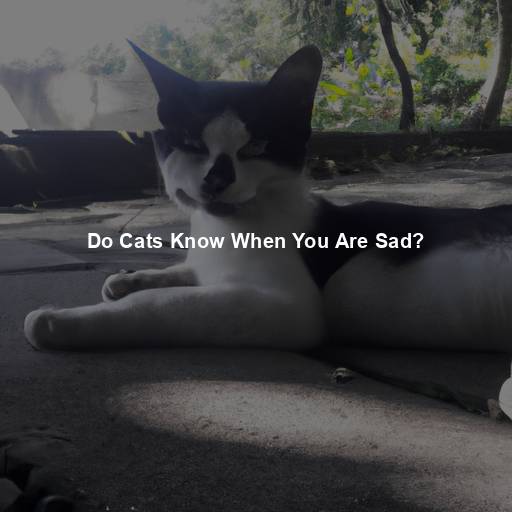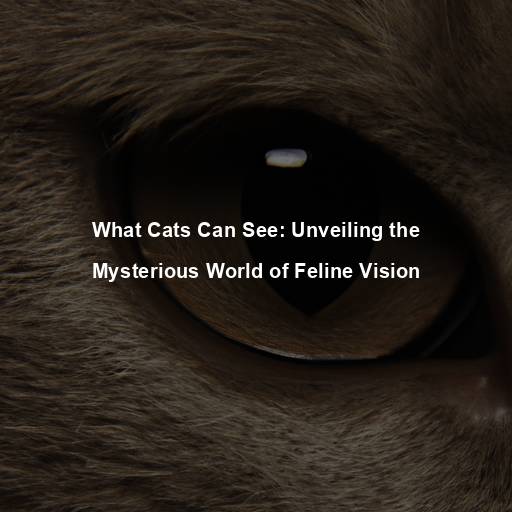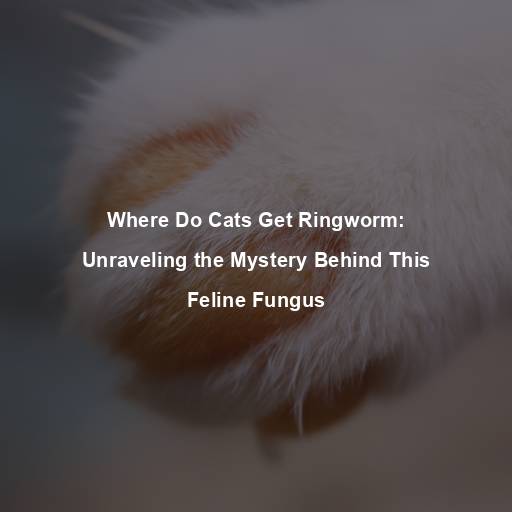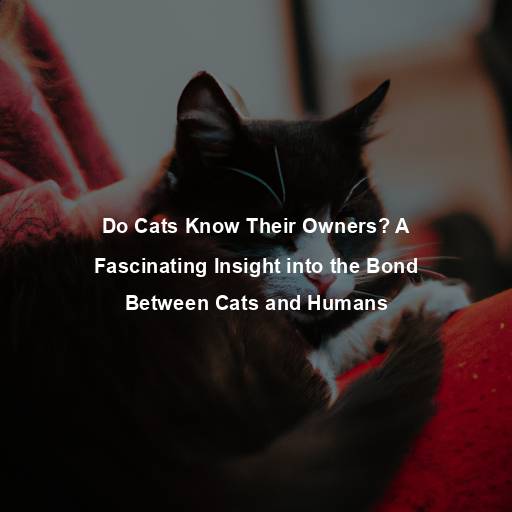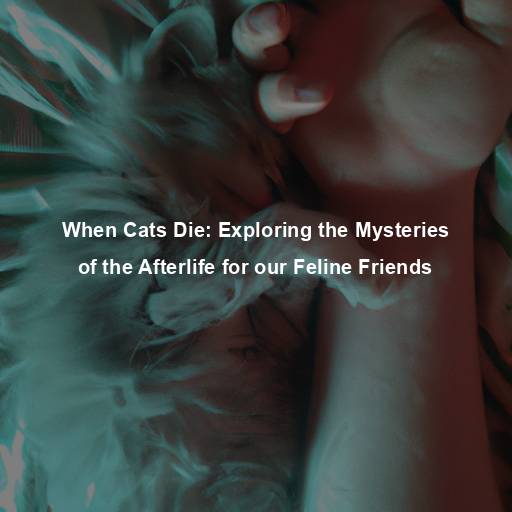Do Cats Know When You Are Sad?
Last Updated on July 20, 2023 by Evan
Contents
- 1 Understanding the Emotional Intelligence of Cats
- 1.1 The Language of Emotions
- 1.2 Cats and Empathy: Unraveling the Mystery
- 1.3 Reading the Signs: How Cats Respond to Human Sadness
- 1.4 The Science Behind Cat Empathy
- 1.5 The Bond Between Cats and Humans
- 1.6 Cats and Emotional Well-being
- 1.7 The Role of Body Language
- 1.8 The Power of Scent
- 1.9 Feline Intuition: A Sixth Sense?
- 1.10 Cats as Emotional Support Animals
- 1.11 Caring for Your Feline Friend
- 2 FAQs for “Do Cats Know When You Are Sad?”
Understanding the Emotional Intelligence of Cats
There has always been an air of intrigue surrounding the enigmatic nature of our feline companions. With their aloof demeanor and bewitching gaze, cats seem to embody an ancient mystique. As cat owners, we often find ourselves engulfed in a whirlpool of perpetually unanswered questions. One such query that often arises is whether our beloved feline friends possess the uncanny ability to decipher and acknowledge our emotional states, especially when we find ourselves engulfed in a sea of melancholy.
The Language of Emotions
Have you ever wondered if our feline friends possess a mysterious ability to detect our sorrows? Well, let’s first dive into the intriguing realm of emotion communication within the animal kingdom. As humans, we often rely on both spoken and unspoken signals to convey our heartfelt sentiments. However, these enigmatic creatures known as cats, oh how they possess a captivating lexicon of their very own when it comes to expressing their emotions.
Cats primarily communicate through body language, vocalizations, and scent marking. They use their tails, ears, eyes, and posture to convey various emotions such as contentment, fear, and aggression. Understanding these subtle cues is essential in deciphering their emotional state and how they may respond to human emotions.
Cats and Empathy: Unraveling the Mystery
Empathy, the ability to understand and share the feelings of others, is a complex cognitive skill often attributed to humans. However, recent research suggests that empathy may not be exclusive to humans and some animals, including cats, may possess varying degrees of empathetic abilities.
Cats are highly attuned to their environment and are capable of picking up on subtle changes. They can detect fluctuations in body language, vocal tones, and even scent cues. This heightened sensitivity, combined with their keen observation skills, leads many experts to believe that cats have the capacity for empathy.
Reading the Signs: How Cats Respond to Human Sadness
While cats may possess empathetic abilities, it is essential to understand that their response to human sadness can vary from one cat to another. Some cats may show more overt signs of concern, while others may exhibit more subtle behaviors. Here are some common ways in which cats may respond to human sadness:
- Increased Affection: Cats may become more affectionate and seek physical closeness when they sense their human companion is feeling down. They may rub against their owner, purr, or offer gentle nudges as a form of comfort.
Purring, the enigmatic symphony of feline happiness, has long captivated our curiosity. While commonly associated with contentment, it unveils an intricate layer of perplexity. Astonishingly, cats have been observed to purr even in the face of adversity, when their human companions find themselves immersed in melancholy. Experts speculate that the mystifying vibrations generated by this ethereal purr possess an uncanny ability to comfort both cat and owner alike, unraveling the intricate threads of their bond.
- Quiet Companionship: Cats are known for their independent nature, but when their human is feeling sad, they may choose to be more present and offer quiet companionship. They may perch nearby or curl up next to their owner, providing a sense of comfort through their mere presence.
The enigmatic nature of feline companionship goes beyond our comprehension. It is as if these elusive beings possess an inexplicable sixth sense. When their human counterparts are enveloped in a wave of melancholy, these mysterious creatures unveil perplexing behavioral shifts. From their once lively demeanor, they retreat into a realm of somber tranquility, drawing themselves nearer to their beloved caretakers in an attempt to offer solace amidst the enigma of sadness.
- Sensitive Observation: Cats are masters of observation, and they may carefully watch their owner’s facial expressions and body language when they are feeling sad. This attentive observation allows them to respond to their human’s emotional state in their own unique way.
The Science Behind Cat Empathy
The mysterious realm of feline intuition often sparks fascination and wonder among cat lovers. Many claim that their furry friends possess an uncanny ability to detect and respond to human sorrow. Yet, the scientific investigation into this phenomenon remains enigmatic, with only a handful of studies delving into the emotional aptitude of our enigmatic companions. Though far from conclusive, these research endeavors offer a glimpse into the complex world of feline empathy, leaving us perplexed yet intrigued.
A fascinating investigation carried out by esteemed scholars from the prestigious University of Lincoln in the United Kingdom has unveiled a captivating discovery: cats exhibit a peculiar inclination to approach individuals who display smiling countenances and employ a melodious tone of voice, as opposed to those exuding sadness or anger. This groundbreaking revelation suggests that our feline companions possess a remarkable ability to discern and react to affirmative emotional signals. The intricate workings of the feline mind continue to astound and confound researchers, provoking curiosity and conjecture in equal measure.
In a recent edition of the esteemed journal “Animal Cognition,” an intriguing study delved into the enigmatic realm of feline perception, specifically probing into cats’ extraordinary prowess to decipher the intricacies of human emotions solely through visual stimuli. Shedding light on these mysterious creatures, the researchers discovered that these enigmatic feline beings possess an uncanny ability to differentiate between affirmative and pessimistic emotional expressions adorning human countenances, hinting at a potential understanding of our complex human world. Such revelations provoke a whirlwind of questions, further unraveling the enigma that is our feline companions’ captivating cognitive capacity.
While these studies offer intriguing insights, more research is needed to fully understand the depths of cats’ emotional intelligence and their ability to perceive human sadness.
The Bond Between Cats and Humans
Regardless of whether cats possess the ability to sense human sadness, there is no denying the strong bond that exists between feline companions and their human counterparts. Cats often provide comfort, companionship, and unconditional love, which can be especially comforting during times of sadness.
With their gentle purring and soothing presence, cats possess an inexplicable power to bring comfort and solace to those fortunate enough to have them as companions. The unwavering emotional support they provide is truly priceless, fostering a deep and profound connection between feline friends and their owners. It is in this mysterious bond that the true magic of the cat-human relationship lies, a bond that continues to astound and perplex both scientists and cat lovers alike.
Cats and Emotional Well-being
While cats may not fully comprehend human emotions, their presence alone can have a positive impact on emotional well-being. Numerous studies have highlighted the therapeutic benefits of interacting with animals, including lower stress levels, reduced anxiety, and improved mood.
In a chaotic world filled with uncertainty, there exists a captivating creature that holds a deeply perplexing power. Cats, those enigmatic beings with their mystifying eyes and graceful movements, have the astounding ability to permeate our souls and bestow upon us an indescribable burst of tranquility. Their unwavering loyalty and unconditional love create an exquisite tapestry of emotional support, weaving together a sense of purpose, companionship, and unadulterated joy, ultimately leaving their owners with a resounding sense of profound emotional well-being.
The Role of Body Language
Cats are highly perceptive creatures when it comes to body language. They can pick up on subtle cues such as facial expressions, posture, and even the tone of voice. When their human companions are sad, cats may exhibit certain behaviors that indicate their understanding of the situation.
Have you ever wondered what your furry feline friend is trying to communicate through their tail? Well, it turns out that a cat’s tail can be quite the mysterious messenger of their emotional state. When they’re feeling cheery and at ease, you might catch their tail standing tall or gracefully swaying. But when they detect a hint of sadness in their beloved human, their tails may sag or curl around themselves, a clear reflection of their empathetic nature.
- Ear Position: Cats also communicate through their ears. When they are happy or curious, their ears may be upright and facing forward. Conversely, if they detect sadness in their human, their ears may flatten or tilt slightly backward, showing a sign of concern.
Cats possess a mysterious ability to forge deep connections with their human counterparts through the power of eye contact. In moments of melancholy, these enigmatic creatures have been known to lock their gaze onto their owners, as if seeking to bestow comfort and empathy upon them. Their unwavering stare leaves us both captivated and perplexed, as we ponder the depths of their fathomless understanding.
The Power of Scent
Cats possess an incredibly heightened olfactory capability, utilizing scent as their medium of communication. The intricacy of their olfactory system empowers them to discern even the slightest fluctuations in human pheromones, serving as a potential insight into our emotional state of being.
- Scent Marking: Cats have scent glands located on various parts of their bodies, including their faces, paws, and tails. They use these glands to mark their territory and communicate with other cats. When their human is sad, cats may engage in scent marking behaviors near their owners as a way to provide comfort and familiarity.
Feline Intuition: A Sixth Sense?
Many cat owners have shared anecdotes about their cats’ seemingly supernatural ability to know when something is wrong. While scientific evidence is limited, there are numerous accounts of cats displaying uncanny intuition when it comes to their human’s emotional well-being.
Have you ever wondered why your feline friend seems to sense your emotions before you even express them? Well, prepare to be bewildered as we unravel the mysterious world of cat behavior. According to countless anecdotes from pet owners, it appears that cats possess an uncanny ability to anticipate moments of sadness in their human counterparts. From restlessness to heightened attention, these enigmatic creatures seem to possess an elusive sixth sense that leaves us in awe.
Cats possess an uncanny proficiency in sensing and responding to the subtle fluctuations of energy around them. It is said that these mystic beings have an innate ability to pick up on any alterations within their surroundings, including the delicate shifts in their owner’s emotional energy. This extraordinary talent enables cats to demonstrate heartfelt empathy and provide comforting solace during moments of sorrow and distress.
Cats as Emotional Support Animals
The unique bond between cats and humans has led to the recognition of cats as emotional support animals (ESAs). ESAs provide comfort, companionship, and emotional support to individuals who may be experiencing mental health issues or emotional distress.
In today’s complex world, many people grapple with emotional and psychological disabilities that can often feel overwhelming. However, there is a glimmer of hope on the horizon for those who may qualify for an ESA certification. This special designation not only grants them the invaluable company of their beloved feline friends or other animals but also offers a soothing balm to their symptoms, providing much-needed emotional support. Discover the incredible benefits of certified ESAs, as they bring solace and relief to individuals navigating the intricate landscape of their innermost thoughts and emotions.
- Benefits of ESAs: Cats, as ESAs, can offer a multitude of benefits to their owners. These may include reduced stress and anxiety, increased feelings of happiness and well-being, and a sense of purpose and responsibility.
Caring for Your Feline Friend
Taking care of your beloved feline companion requires more than just offering a bowl of kibble and a cozy bed. Building a solid connection with your enigmatic ball of fur involves a delicate balance of providing the right care and showering them with ample affection. From maintaining a healthy diet tailored to their specific needs to engaging in stimulating playtime sessions and regular grooming, these essential tips will help you unlock the secrets of fulfilling your cat’s physical and emotional needs. So, embark on this feline adventure armed with knowledge and dedication, and watch your bond with your mysterious whiskered friend flourish like never before.
Taking proper care of your feline friend is an essential responsibility. Stay on top of their health by making regular appointments with a trusted veterinarian. Vaccinations, parasite control, and dental care should not be overlooked, as they play a crucial role in ensuring your cat’s overall well-being. Keep your furry companion in optimal health by staying proactive and addressing any concerns promptly.
Providing your beloved cat with a nourishing and well-rounded diet is paramount to their overall well-being. It is essential to tailor their food intake to suit their specific age and health circumstances. To gain comprehensive insight into the optimal food choices for your feline companion, seek guidance from a trusted veterinarian who can offer invaluable advice.
Enhance your cat’s surroundings with enticing upgrades that ignite their curiosity and keep them entertained. From strategically placed scratching posts to an array of stimulating toys, layer their environment with endless avenues for mental and physical engagement. Allow your feline companion to flourish by offering ample vertical spaces that invite them to climb and explore, unleashing their innate instincts and ensuring a state of blissful satisfaction.
- Encouraging Social Connections: Embrace the joy of shared experiences and building connections with your furry companion. Devote time to engaging in interactive play sessions to stimulate both their physical prowess and the emotional bond you share. Through these animated moments, you’ll find yourself truly immersed in the delightful journey of feline companionship.
Taking care of your furry friend goes beyond just cuddles and treats. It involves some serious grooming business. Think fur so sleek, it glimmers in the sunlight and claws so well-manicured, you’d mistake them for tiny gems. And let’s not forget those cute little ears that need a bit of TLC.
FAQs for “Do Cats Know When You Are Sad?”
Can cats sense when you are sad?
Yes, cats have the ability to sense when you are sad. They are highly perceptive creatures and can pick up on changes in your behavior, tone of voice, and body language. Cats are known to be extremely in tune with their owners and the environment around them, so they are often able to detect when something is amiss. If you’re feeling down or upset, your cat may come close to you, purr, rub against your legs, or even try to curl up next to you, showing their empathetic nature.
How do cats react when their owners are sad?
When humans are feeling down, cats have a knack for showing their empathy in unexpected ways. They may sidle up to their owners, emitting a soothing purr, and show affection by nuzzling against their legs or showering them with gentle licks. Some feline friends even attempt to lighten the mood by engaging their owners in playful antics or bringing them tiny toys as a diverting gesture. While each cat’s response may vary, most cats possess an innate ability to offer solace and support whenever they sense their beloved humans are in the midst of emotional turmoil.
Can cats help with sadness or depression?
Yes, cats can provide emotional support and help alleviate feelings of sadness or depression. The presence of a cat can offer a sense of companionship, unconditional love, and comfort. Interacting with a cat, whether it be through petting, playing, or simply observing their calming behavior, can release endorphins that help improve mood and reduce stress. The rhythmic sound of a cat’s purring has also been known to have a soothing effect, promoting feelings of relaxation and reducing anxiety. However, while cats can bring immense joy and support, it’s important to consult a healthcare professional for a comprehensive treatment plan if you’re struggling with depression.
Do all cats respond the same way to sadness?
No, not all cats respond in the same way when their owners are sad. Just like humans, cats have distinct personalities and temperaments. While some cats may be extremely attuned to their owners’ emotions and offer immediate comfort, others may exhibit indifference or display different behaviors altogether. Some cats may become more aloof when their owners are sad, preferring to observe from a distance rather than directly engaging. It’s important to remember that each cat is unique and their response to sadness may vary.
Can cats sense other types of emotions too?
Yes, cats have a remarkable ability to sense a wide range of human emotions. They can discern not only sadness but also happiness, anxiety, fear, anger, and many other emotions. This sensitivity comes from their acute observation skills, enhanced senses, and the strong bond they share with their owners. Cats can detect subtle changes in body language, vocal cues, and overall energy emitted by their owners. Therefore, they can often accurately interpret and respond to different emotional states, making them exceptional companions in times of various emotional needs.

